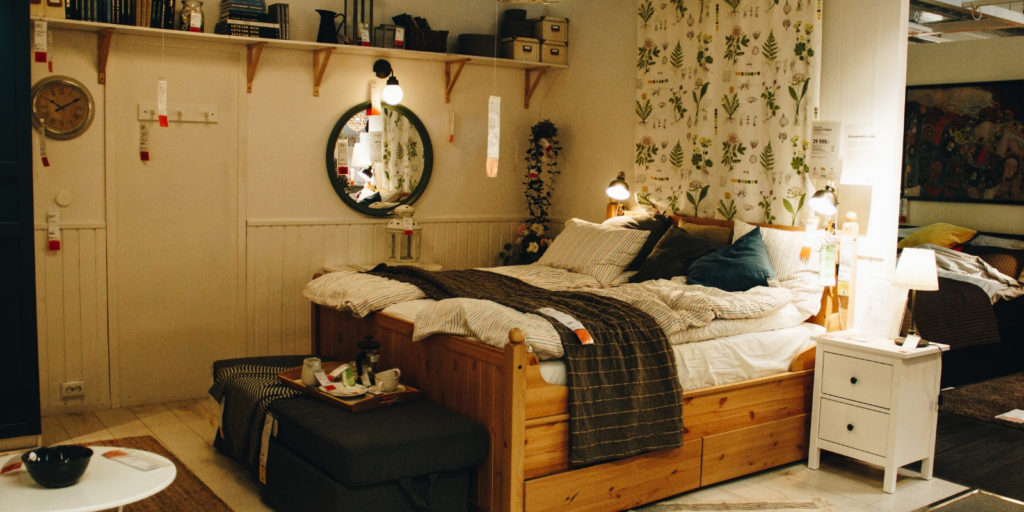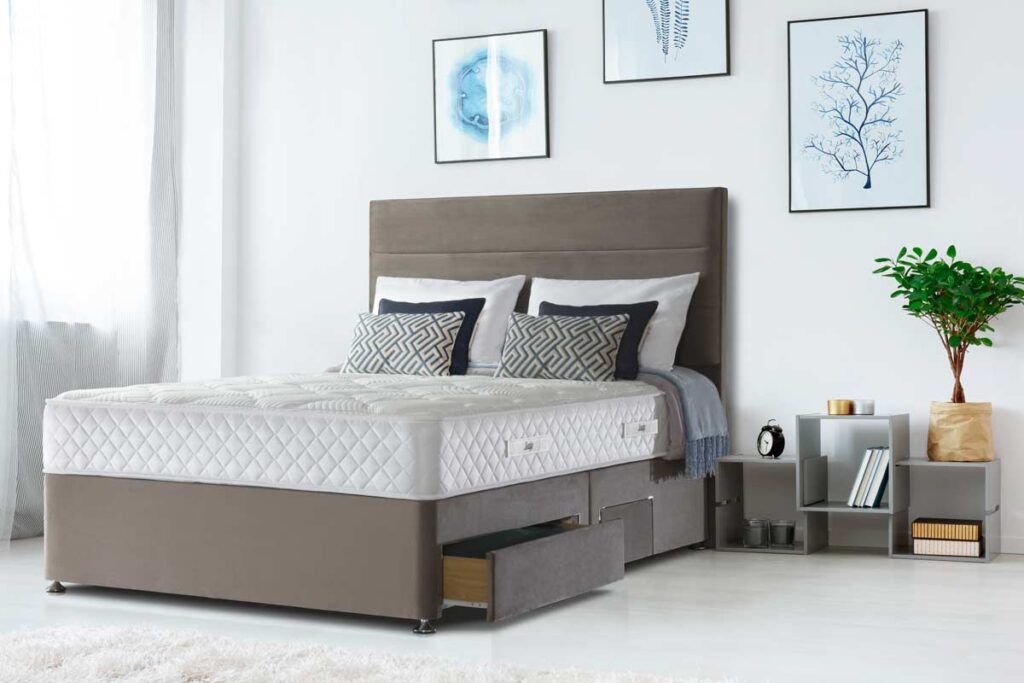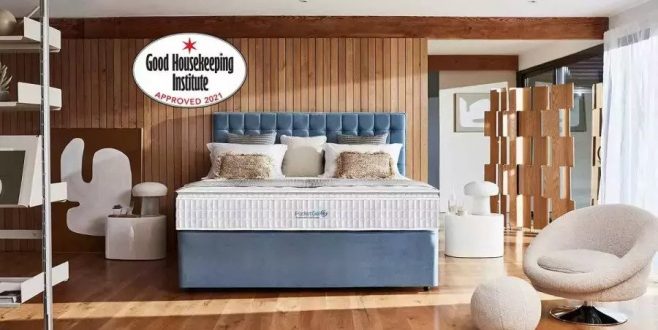All of us know by now the importance of sleep and the crucial role it plays in our day to day lives.
In recent articles we’ve discussed factors that can contribute to poor sleep quality, from technology and screen time, to eating too close to bed, bad mattresses and more. We’ve also taken a brief look into what we can do to enhance sleep of ours, in order to function in daily life the best we possibly can.
However, has exercise been helping you sleep? Do playlists help you drift off and make you feel like you’re on a cotton candy cloud? If not, don’t worry. When we say there are many things you can do to try and improve your sleep, we mean there are MANY – and maximising your bedroom environment is one of them. Intrigued to know more? We thought you would be, you can just keep reading.
Why Do We Need To Maximise Our Bedroom Environment?
To put it in shorter, and much simpler terms – to help our sleep and the way we use and see our bedroom. You may not think it has an impact on our sleep cycles, but surprise – it does. It’s no doubt that lack of sleep has a negative impact on our body, which is where the coffee comes in and you’re downing your 3rd one before noon on a Monday afternoon at work. With that being said, more people are starting to make sleep a priority by following bedtime routines, exercising and maintaining a healthy, balance diet.
What do you think would happen if you cleaned your room, turned off your electronic devices and tried to sleep? It’s always the little things that can make the biggest difference.
Tips On Improving Your Bedroom For Better Sleep
Declutter
Decluttering and organising your room may not seem like a task that could help with your sleep but give it a try and you’ll see for yourself the subtle change it has. Not only that, but
decluttering is a method used in mental health, and so it’s important that the environments we surround ourselves in isn’t adding to our stress or taking up too much of our headspace. Clutter can be categorised as anything you like, whether it’s physical, digital or mental. By removing and reducing things in our immediate environment that no longer bring us joy, it’s extremely beneficial to our mental health and our bedroom environment. So, it’s definitely one way to tackle two things at once!
You don’t have to do it all at once, you can start of small. Start with your bedroom desk or wardrobe for example, just work through what needs throwing out, and what needs more organisation. Having your bedroom as the place to go for other activities will lead your brain to associate the room with those particular activities. For example, if you tend to do some work at your desk in your room, your brain will know and therefore keeps your mind busy.
You bedroom should be a place of relaxation and calm, so if say goodbye to work in the bedroom! Try to create a bedtime routine that gets your mind and your body ready for sleep, it really does work wonders.
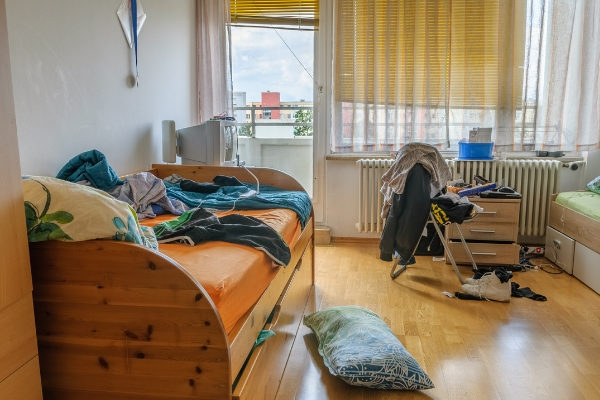 Set A Bedtime For Your Electronics
Set A Bedtime For Your Electronics
In our previous article,
how to form a healthier relationship with technology, we discuss the implications that technology has on our sleep and how we collectively need to be in control of it. The amount of screen time we receive from watching TV, looking at our phones, playing video games or playing on an iPad, is more than likely over the recommended amount of hours. By setting a bedtime for our phones, televisions and any other electronic devices we possess, it sets a routine which ultimately our brain and body will follow too. The reduction in light emissions and screen brightness makes the brain think “oh right, it must be time for some sleep!”.
So, ditch all of your electronics and look forward to a better bedroom environment, and improved sleep.
 Create A Nice, Soothing Ambience
Create A Nice, Soothing Ambience
Having a nice ambience in your bedroom allows for calm and relaxation, which is exactly what you need before sleep. Ensure the room is relatively dark with no light directly on your face, keep your room quiet or if you prefer to listen to sleep playlists or white noise, do exactly that. It’s all about creating an atmosphere that feels natural and comfortable to you, so this step will be different for everyone.
Have A Comfortable Bed
Bad mattresses and beds are another sleep thief and we don’t actually realise we have a problem with them until we’ve lost quite a bit of sleep already! Investing in a quality mattress first of all, is one of the wisest choices you will make. As we get older, we appreciate and saviour sleep even more. If you have your suspicions that your mattress is not living up to it’s full potential, and you’re waking up with a few aches and pains, it’s time to get your inspection game on.
Inspect the mattress for spring issues, and you feel as though you’re in need of a new one that feels like actual heaven, it’s time to start thinking about one. Consider one that will best suit your needs when it comes to sleeping positions and comfort.
Check out our
mattress buying guide to help!
 Room Makeover
Room Makeover
A study in the UK has showed that the colour of your bedroom can have an impact on the amount of sleep you get. How does this work exactly? Colour associations are often cultural, but there are particular colours in which are found to be more relaxing, calming and soothing. Blue, yellow and green colours actually enhance your sleep, whereas black, purple, brown and grey have a negative impact on sleep. If you’re looking to redecorate the colour of your room, we have a number of colours below and a list of what is associated with them to help you decide:
•
Red – mostly associated with love and passion, it’s a highly emotional colour and can be used as a negative colour too being related to anger, rage and violence
•
Orange – often associated with energy, friendly and social. It’s known as a warm colour
•
Yellow – known for happiness and positivity. Supposedly, yellow releases a chemical in the brain called serotonin which drives happy moods
•
Green – a calming colour associated with growth, nature and the environment
•
Blue – a calming colour associated with reliability and trust
•
Pink – A soft pink conveys compassion and is relaxing
Those are our top 5 tips when it comes to maximising your bedroom environment in order to get the sleep you actually deserve. By making small changes and realising things can be developed to improve your sleep health, you’re already on your way to experiencing magical sleep.
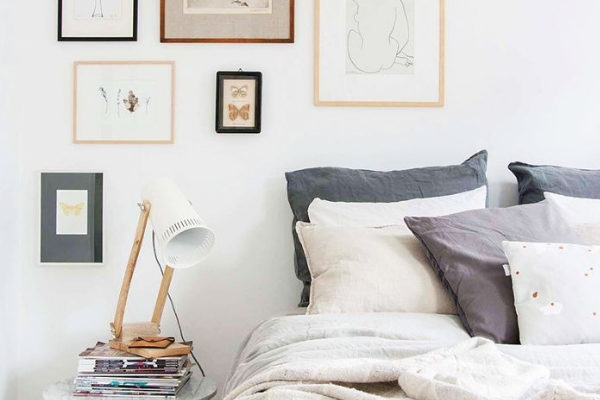
 Set A Bedtime For Your Electronics
In our previous article, how to form a healthier relationship with technology, we discuss the implications that technology has on our sleep and how we collectively need to be in control of it. The amount of screen time we receive from watching TV, looking at our phones, playing video games or playing on an iPad, is more than likely over the recommended amount of hours. By setting a bedtime for our phones, televisions and any other electronic devices we possess, it sets a routine which ultimately our brain and body will follow too. The reduction in light emissions and screen brightness makes the brain think “oh right, it must be time for some sleep!”.
So, ditch all of your electronics and look forward to a better bedroom environment, and improved sleep.
Set A Bedtime For Your Electronics
In our previous article, how to form a healthier relationship with technology, we discuss the implications that technology has on our sleep and how we collectively need to be in control of it. The amount of screen time we receive from watching TV, looking at our phones, playing video games or playing on an iPad, is more than likely over the recommended amount of hours. By setting a bedtime for our phones, televisions and any other electronic devices we possess, it sets a routine which ultimately our brain and body will follow too. The reduction in light emissions and screen brightness makes the brain think “oh right, it must be time for some sleep!”.
So, ditch all of your electronics and look forward to a better bedroom environment, and improved sleep.
 Create A Nice, Soothing Ambience
Having a nice ambience in your bedroom allows for calm and relaxation, which is exactly what you need before sleep. Ensure the room is relatively dark with no light directly on your face, keep your room quiet or if you prefer to listen to sleep playlists or white noise, do exactly that. It’s all about creating an atmosphere that feels natural and comfortable to you, so this step will be different for everyone.
Have A Comfortable Bed
Bad mattresses and beds are another sleep thief and we don’t actually realise we have a problem with them until we’ve lost quite a bit of sleep already! Investing in a quality mattress first of all, is one of the wisest choices you will make. As we get older, we appreciate and saviour sleep even more. If you have your suspicions that your mattress is not living up to it’s full potential, and you’re waking up with a few aches and pains, it’s time to get your inspection game on.
Inspect the mattress for spring issues, and you feel as though you’re in need of a new one that feels like actual heaven, it’s time to start thinking about one. Consider one that will best suit your needs when it comes to sleeping positions and comfort.
Check out our mattress buying guide to help!
Create A Nice, Soothing Ambience
Having a nice ambience in your bedroom allows for calm and relaxation, which is exactly what you need before sleep. Ensure the room is relatively dark with no light directly on your face, keep your room quiet or if you prefer to listen to sleep playlists or white noise, do exactly that. It’s all about creating an atmosphere that feels natural and comfortable to you, so this step will be different for everyone.
Have A Comfortable Bed
Bad mattresses and beds are another sleep thief and we don’t actually realise we have a problem with them until we’ve lost quite a bit of sleep already! Investing in a quality mattress first of all, is one of the wisest choices you will make. As we get older, we appreciate and saviour sleep even more. If you have your suspicions that your mattress is not living up to it’s full potential, and you’re waking up with a few aches and pains, it’s time to get your inspection game on.
Inspect the mattress for spring issues, and you feel as though you’re in need of a new one that feels like actual heaven, it’s time to start thinking about one. Consider one that will best suit your needs when it comes to sleeping positions and comfort.
Check out our mattress buying guide to help!
 Room Makeover
A study in the UK has showed that the colour of your bedroom can have an impact on the amount of sleep you get. How does this work exactly? Colour associations are often cultural, but there are particular colours in which are found to be more relaxing, calming and soothing. Blue, yellow and green colours actually enhance your sleep, whereas black, purple, brown and grey have a negative impact on sleep. If you’re looking to redecorate the colour of your room, we have a number of colours below and a list of what is associated with them to help you decide:
• Red – mostly associated with love and passion, it’s a highly emotional colour and can be used as a negative colour too being related to anger, rage and violence
• Orange – often associated with energy, friendly and social. It’s known as a warm colour
• Yellow – known for happiness and positivity. Supposedly, yellow releases a chemical in the brain called serotonin which drives happy moods
• Green – a calming colour associated with growth, nature and the environment
• Blue – a calming colour associated with reliability and trust
• Pink – A soft pink conveys compassion and is relaxing
Those are our top 5 tips when it comes to maximising your bedroom environment in order to get the sleep you actually deserve. By making small changes and realising things can be developed to improve your sleep health, you’re already on your way to experiencing magical sleep.
Room Makeover
A study in the UK has showed that the colour of your bedroom can have an impact on the amount of sleep you get. How does this work exactly? Colour associations are often cultural, but there are particular colours in which are found to be more relaxing, calming and soothing. Blue, yellow and green colours actually enhance your sleep, whereas black, purple, brown and grey have a negative impact on sleep. If you’re looking to redecorate the colour of your room, we have a number of colours below and a list of what is associated with them to help you decide:
• Red – mostly associated with love and passion, it’s a highly emotional colour and can be used as a negative colour too being related to anger, rage and violence
• Orange – often associated with energy, friendly and social. It’s known as a warm colour
• Yellow – known for happiness and positivity. Supposedly, yellow releases a chemical in the brain called serotonin which drives happy moods
• Green – a calming colour associated with growth, nature and the environment
• Blue – a calming colour associated with reliability and trust
• Pink – A soft pink conveys compassion and is relaxing
Those are our top 5 tips when it comes to maximising your bedroom environment in order to get the sleep you actually deserve. By making small changes and realising things can be developed to improve your sleep health, you’re already on your way to experiencing magical sleep.

